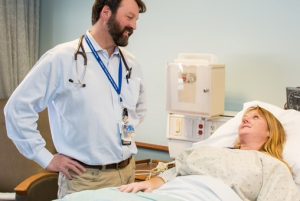 Observation Care
Observation Care
We would like to ensure that you are well-informed about essential aspects of the care you receive at Sheridan Memorial Hospital and how it may impact your billing. Depending on the required level of care, our facility provides inpatient, outpatient, and observation services.
Observation care is an outpatient service provided within the hospital. With observation care, you are not admitted as an inpatient because your doctor has determined that your current condition has not met inpatient requirements.
If admitted to the hospital, you will fall into one of two categories: inpatient or observation outpatient.
When you hear you need observation care, it means your doctor wants to closely monitor your condition for some more time in the hospital. This helps the doctor decide if you need more treatment in the hospital as an inpatient or if you can safely be discharged. If you are discharged, your care may continue with visits to your doctor’s office.
Observation stays can happen anywhere in the hospital. Your Outpatient Observation may start in the Emergency Room, but you could be moved to another area of the hospital for the length of your stay.
Observation care is a lower acuity hospital stay of about 24 hours, while inpatient admission can go longer. When you undergo your initial evaluation, medical professionals will assess whether your condition can be effectively treated within the 24-hour timeframe of observation care or if it requires an extended inpatient stay.
- Inpatient: Medically complex and expected to be in the hospital for more than two nights.
- Observation: not medically complex or not expected to be in the hospital for two nights.
- Outpatient: Procedure with a length of stay less than two nights.
- Covered medications: medications given through an IV and some chemotherapy medications
- Not covered medication: medications you normally give yourself at home, also referred to as “self-administered medications,” such as oral medications, inhalers, and insulin injections.
For safety reasons, Sheridan Memorial Hospital does not allow you to take medications brought from home. If you have a Medicare prescription drug plan (Part D), your plan may help you pay for these medications. You’ll likely need to pay out-of-pocket for these medications and submit a claim to your drug plan for a refund. Contact your drug plan for more information.
* Please refer to How Medicare Covers Self-Administered Drugs in Hospital Settings or the online version of the National Medicare Handbook at www.medicare.gov or call 1.800.633.4227 if you need more information.
* Your “Medicare and You” handbook has a complete list of deductibles/services covered by observation/outpatient status.
How much one pays for observation care depends on your insurance plan. Most insurance companies consider observation as outpatient care, which is billed differently than if you are admitted to the hospital for a longer inpatient stay. For example, Medicare Part B covers 80% of observation care costs. If you have supplemental insurance, you can use that to cover the rest.
If you have another insurance plan, please contact the customer service number on the back of your insurance card to verify coverage.
Observation is appropriate for conditions that can typically be treated within 24-48 hours or for conditions that require symptom management while the cause is being determined.
Some examples of such conditions include:
- abdominal pain
- acute pain (not cancer-related)
- allergic reaction (excluding anaphylactic)
- asthma
- chest pain
- concussion
- constipation
- dehydration
- fainting
- nosebleed
- headache
- hypoglycemia
- kidney stones
- and TIA (stroke).
If your medical condition and hospital treatment plan support an inpatient hospital stay, your physician will write an order to change your status from observation to inpatient.
If it is determined that your condition does not meet the coverage guidelines for inpatient care set by your insurance or Medicare, your doctor will be notified. If your care can be provided in a less acute setting that is not a hospital, the hospital will assist you in the discharge process and help coordinate appropriate follow-up care.
Outpatient observation may be necessary after an outpatient surgical procedure if there are complications that need monitoring. Normally, outpatient surgery involves having the procedure and being discharged on the same day.
However, if you require additional monitoring after surgery, your physician may place you into observation to monitor you further.
Some post-surgical conditions that may require further evaluation in outpatient observation include the inability to urinate, inability to keep solids or liquids down, uncontrollable pain, unexpected surgical bleeding, unstable vital signs, and inability to safely walk after spinal anesthesia.
Medicare or insurance will only cover an overnight stay if there is a medical condition that requires post-operative monitoring. If you choose to stay overnight for patient or family convenience, you will be responsible for payment.
No, outpatient observation days do not count toward the 3-day inpatient stay required for admission to a skilled care facility under Traditional Medicare. If you need skilled nursing care in a nursing home after an outpatient observation stay, you may not qualify for Traditional Medicare’s skilled nursing facility benefit.
Have questions about your level of care? Call 307.672.1000 and ask to speak to a Case Management Specialist.
Have questions regarding your hospital bill? Call Sheridan Memorial Hospital Patient Financial Services at 307.672.1010.
